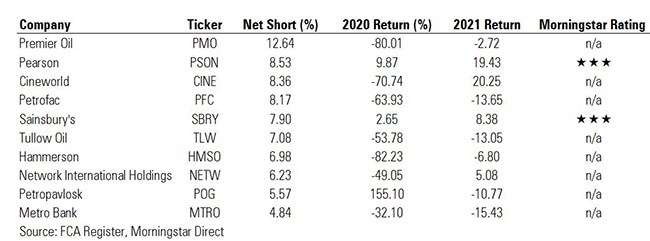
The audacious move by members of an online messageboard to ramp up certain US stocks and play professional money managers at their own game has once again brought short selling into the limelight.
In this case, those day traders driving up the like of electronics retailer GameStop (GME) effected a short squeeze, a move usually associated with hedge funds (my colleague Karen Wallace explains how they managed to this).
GameStop and the Short Squeeze
A short squeeze involves trying to manipulate the price of a share upwards to flush out those who are betting that the price will fall. “When someone shorts a stock, they’re trying to sell something that they don’t actually own because they think they can make money later by buying it back at a lower price. Hedge funds do this a lot, but short-selling can be very complicated and risky for individual investors to attempt,” Wallace explains.
Short-selling can be a highly profitable way to exploit the falling share price of companies in distress, such as those astute traders who built up short positions in Wirecard as rumours started to emerge slowly of the financial irregularity at the German fintech. Nearly a year on we still don’t know what really happened in this case, according to European fund manager Alexander Darwall, who got caught up in the scandal. In Gamestop and AMC’s case, there’s no suggestion of financial irregularity, it’s just that the businesses are out of favour for a variety of reasons; professional money managers shorted them, and day traders have (so far) won this particular tug of war.
But short-sellers can come a cropper too; Jupiter Absolute Return fund manager James Clunie held a short position in Tesla (TSLA) going into 2020, when the shares rose 700%. He left the asset manager at the end of 2020.
There are signs that UK companies have been caught up in the US drama too, with steep rises in late January in the shares of some of the most shorted companies. For example, shares in educational publisher Pearson (PSON), which is the second most shorted stock in the FTSE, spiked 15% in the first few hours of trading on January 28, with 6 million shares changing hands that day - double the average trading volume. This “short covering” involves traders going into the market to buy shares to cover positions, in case the prices rises dramatically (remember that they don't actually own the shares they are short of). Short sellers face the predicament that the maximum loss for a share is -100% but the gain is potentially infinite (or many multiples in a year, as Tesla shorters found out).
The UK's Most Shorted
Looking at the Financial Conduct Authority’s daily list of short positions, seven of 10 most shorted companies nursed heavy losses in 2020, with oil company Premier Oil (PMO) and commercial property company Hammerson (HMSO) shedding 80% as both sectors were hit hard by the pandemic. Cineworld (CINE) shares have been hard hit by lockdown restrictions, losing 70% in 2020 – but there has been an abrupt turnaround, with gains of 20% posted in January alone. That's despite the fact that nothing has changed in the outlook for cinemas, with no signs of the UK lockdown coming to an end before March.

Miner Petropavlosk (POG) is the outlier in this list; despite boardroom turmoil, the company’s shares rose 155% in 2020. Supermarket giant Sainsbury’s (SBRY) may seem like an odd choice of short for hedge funds because of grocery demand since lockdown and, indeed, the shares have risen sharply since September. But professional investors are worried about debt levels in excess of £6 billion and company strategy after a mega-deal with Asda was nixed by competition authorities. The shares are now up more in January than for the whole of 2020.
Will GameStop Kill Off Shorting?
While the GameStop phenomenon is still playing out, short selling is likely to remain part of how markets operate for some time to come. It’s possible that short squeezers may get the blame this time, says AJ Bell’s investment director Russ Mould.
“History shows that the authorities only step in once the bubble bursts and the damage is done. Short sellers are often blamed, even if in the end it is the speculative buyers who take asset prices to unsustainable levels who are ultimately at fault. But a market collapse does tend to prompt a policy response,” says Mould.
Barry Norris, chief executive of Argonaut Capital, is sceptical that the recent events could kill off short selling. “Although the price of any asset can be manipulated in the short-term, ultimately an investment made solely on price momentum requires incremental buyers at ever-higher prices. When inevitably these dry up –with no commensurate improvement in the company’s trading prospects – then the stock will eventually collapse,” he says.
Recent examples of fraud and mismanagement have been exposed by short sellers doing their research and uncovering “an unpalatable truth”, he adds, citing Wirecard in Germany and NMC Healthcare in the UK. “Short sellers often unmask fraudulent management, as well as exposing poor business models,” he says.




























